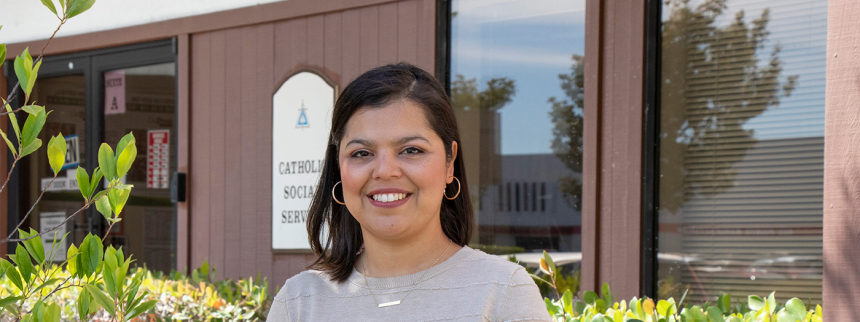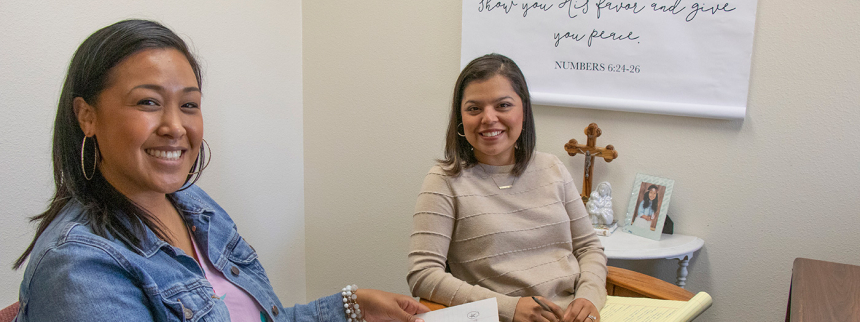
“It’s easy to categorize those on the margins and those not on the margins,” says Miriam Sammartino, executive director of Catholic Charities of Yolo-Solano. “If you think about it, we’re all on the edge of that margin.”
She makes an eloquent case for how everyone skirts the edge and owns a share of misfortune. This common reality, albeit experienced on a variety of levels and not solely in the economic realm, compels and convicts Christians to walk with those in need.
An attorney, an immigrant and an advocate, Miriam admits “I am a very vocal person and I ask a lot of questions,” casually linking these characteristics to “the huge leap from being an attorney to Catholic Charities.”
“We’re all born with that need to feel useful and help others,” she professes, describing the limiting factors of practicing immigration law. “People tell you their whole life story and they have all these needs,” she recalls, sharing how her clients’ hardships pulled at her heart. With obvious discomfort she asks: “How can I help them with all these other issues?”
After years of volunteering, chairing events and referring clients to Catholic Charities, Miriam joined the board of directors, living out her desire to do more and make the organization even stronger despite its revered 75-year history in Vallejo. When the opportunity came up to serve as executive director, “I couldn’t let go of the notion that this is the way to serve everybody in every aspect of their lives,” she says with clarity on how to usher the marginalized over the threshold of hope.
“Catholic Charities is the official social service agency of the church and its mission is very clear,” Miriam says, noting it is the only non-profit in the area which provides immigration and legal services. “I wanted to make sure I was involved in helping this agency thrive and in reaching more people,” she adds, committed to living her faith every day.
The best referral
Miriam’s shares her own story of her family’s immigration journey from Nicaragua right after the Sandinista takeover about 40 years ago. With her parents and brother, they crossed the border into Mexico and continued to the United States. Her father’s family had arrived earlier and lived in San Francisco; it would be their destination too.
Just a year and a half old at that time, Miriam remembers growing up with a “sense of fear” and reflects on the stories of her parents learning English, working hard to make ends meet, and the crucial decision to seek documentation and become legalized.
“Catholic Charities of San Francisco referred us to a private attorney,” Miriam says, recounting how he accepted their case and helped the young family. “He was so gracious and gave my parents a monthly payment plan,” she explains, citing how “you don’t really see that in the legal field!”
“It changed our lives completely,” she says, insisting that the good work of Catholic Charities was “the best referral.” She speaks of the trust and shared values they experienced and how their attorney became a role model for Miriam. She was inspired to choose the profession of immigration law and pay forward the generosity of offering monthly payment plans and pathways to immigrants seeking help.
“There can be so much fraud, and people can be easily fooled when you don’t know the language or understand the system,” she says, holding tight to childhood reminders that “we need other people…we need each other.”
‘Show it through love’
Miriam describes the work of Catholic Charities Yolo-Solano as a “vehicle of service,” building bridges and accompanying people until their needs are met.
“People need to be brave enough to stand up and help others,” she challenges, but yet gently in the context of faith and courage. She calls for advocacy and diligence as a means “to be in front of the issues.”
“We try to make sure that in everything we do, we are considering the sacredness of every human person,” Miriam says of the agency’s work. “We want to ensure that every person who comes through our door is able to thrive spiritually, socially, in the family setting and in the work setting,” she explains, pointing to an overarching office philosophy of “show it through love.”
The programs offered provide the necessary structure for “stabilizing and strengthening families,” reports Miriam, who has been executive director for 18 months. Working in the Solano County office in Vallejo most of the time, and in the newer Yolo County office in Woodland once a week, Miriam and her staff of 12 deliver three primary services: family assistance, immigration services and counseling. However, given the uniqueness of each region, the extent of offerings varies greatly.
Having opened only two years ago, the Woodland office continues to develop and make inroads within the expansive service area. Miriam acknowledges the difficulty in reaching every corner and tells how the absence of an established network of non-profits within the isolated communities slows their ramp up and limits their ability to refer and serve in areas beyond their scope.
She stresses that outreach is different in Yolo County, noting that community engagement is their most important work right now as they build trust and reach out to parishes and community members. Their incremental efforts forge the possibility for partnerships which someday will translate into meeting the needs of more people. Currently, the Yolo office only offers immigration services, but as Miriam puts it, “we’re reaching for the stars.” She hopes to have one counselor by the end of the year and anticipates the availability of full counseling services thereafter.
The wish list includes community-based mental health services such as support groups and parenting classes, she adds, but concedes that community support and funding is needed to sustain such offerings.
Conversely, the Solano County office enjoys a long history and solid reputation for its work in Vallejo. A range of non-profit agencies, good transportation options and its urban nature have benefitted the agency’s capacity to serve many people.
“It’s a delicate balance though,” Miriam concedes, recognizing that other cities in Solano County experience great need too. Expansion must thoughtfully consider how to sustain Vallejo’s services while also growing in both Solano and Yolo counties.
Family assistance services represent the largest percentage of the agency’s work in Vallejo with more than 3,000 people served each year, primarily through its food pantry program. Miriam is gratified in knowing that families receive three days of food -- including non-perishable canned goods -- but also an assortment of fruits, vegetables and milk. They also help families apply for CalFresh to complement their food budgets and alleviate the financial stress and anxiety which comes with having insufficient food for your family. Nutrition education rounds out the offering and ensures that families learn and employ healthy lifestyle habits.
Immigration services are a smaller percentage of Catholic Charities’ work, but a fundamental focus. “Immigration services touch the family on so many levels,” Miriam says passionately, remembering the life-changing impact on her own family and others whom she helped. She reports that about 180 families are served each year, but believes more could be served if not for the lengthier amount of time it’s taking to process applications.
Counseling and therapy services lend a vital support to individuals coping with depression, anxiety and variety of stressors due to their life circumstances. “Families are going through a lot,” Miriam says, indicating that counseling can be a necessary pairing offered in tandem with other services. “We cross promote services,” she says, intending to make known to every family the breadth of what is available to them.
Throughout all services, Miriam and her staff weave in love and faith. They ask clients if they might pray together or for them. They open meetings with prayer and study Catholic social teaching. “We make sure that all our interactions connect back to our mission,” Miriam promises, highlighting every person’s worth and value.
‘Come see this joy that we see every day’
Encouraging everyone to do more and volunteer, Miriam does not hesitate to invite others to share in her work and ministry. Whether needing services or choosing to be a part of the mission as a volunteer, she notes, “There’s plenty to do at all three Catholic Charities’ offices in the diocese.”
“When people come through here and say, ‘God bless you,’ no matter what kind of day you’re having, it makes your day,” she says citing the magic of a hug and an authentic “thank you.” “Wow, this is love,” she says.
“Often we feel the tugging of the Holy Spirit to be a vehicle of service and to strengthen our faith,” Miriam suggests, but wondering, too, how often “life gets in the way.” She exudes zeal and asks a series of introspective questions for consideration: “What impact do I want to have? How am I professing mercy? How do they need me?”
For Miriam, she is sure the answers lie in charity, mercy and love, and that the combination of all three usher the marginalized over the threshold of hope.
LEARN MORE
About Catholic Charities of Yolo-Solano at www.ccyoso.org


